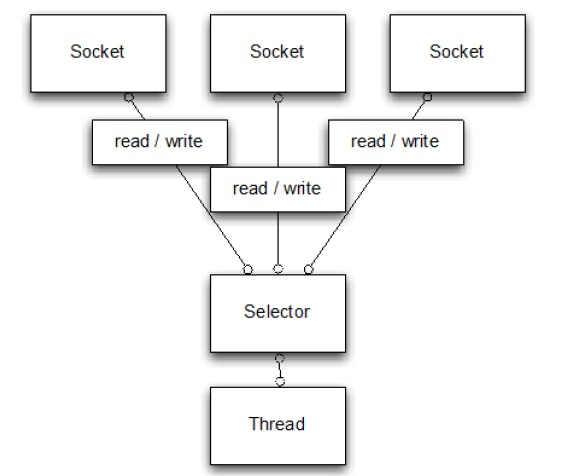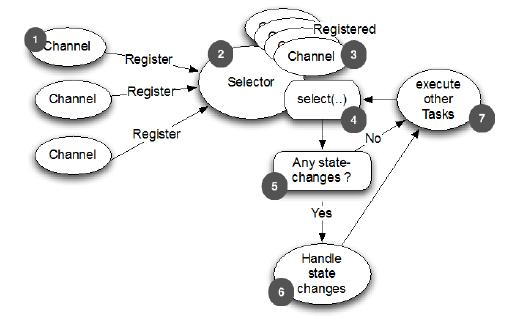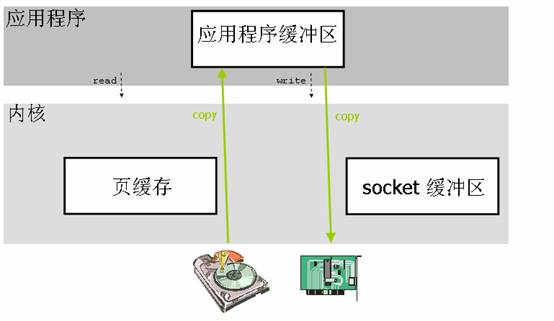Netty入门(1) - 简介
什么是Netty?
Netty 是一个利用 Java 的高级网络的能力,隐藏其背后的复杂性而提供一个易于使用的 API 的客户端/服务器框架。
Tomcat和Netty有什么区别?
Netty有什么优点?
并发高


传输快
Java的内存有堆内存、栈内存和字符串常量池等等,其中堆内存是占用内存空间最大的一块,也是Java对象存放的地方,一般我们的数据如果需要从IO读取到堆内存,中间需要经过Socket缓冲区,也就是说一个数据会被拷贝两次才能到达他的的终点,如果数据量大,就会造成不必要的资源浪费。Netty针对这种情况,使用了NIO中的另一大特性——零拷贝,当他需要接收数据的时候,他会在堆内存之外开辟一块内存,数据就直接从IO读到了那块内存中去,在netty里面通过ByteBuf可以直接对这些数据进行直接操作,从而加快了传输速度。

public class NettyNioServer {
public void server(int port) throws Exception {
final ByteBuf buf = Unpooled.unreleasableBuffer(
Unpooled.copiedBuffer("Hi!\r\n", Charset.forName("UTF-8")));
EventLoopGroup group = new NioEventLoopGroup();
try {
ServerBootstrap b = new ServerBootstrap();
b.group(group)
.channel(NioServerSocketChannel.class)
.localAddress(new InetSocketAddress(port))
.childHandler(new ChannelInitializer<SocketChannel>() {
@Override
public void initChannel(SocketChannel ch)
throws Exception {
ch.pipeline().addLast(new ChannelInboundHandlerAdapter() {
@Override
public void channelActive(ChannelHandlerContext ctx) throws Exception {
ctx.writeAndFlush(buf.duplicate()).addListener(ChannelFutureListener.CLOSE);
}
});
}
});
ChannelFuture f = b.bind().sync();
f.channel().closeFuture().sync();
} finally {
group.shutdownGracefully().sync();
}
}
}
相关概念
Channel,表示一个连接,可以理解为每一个请求,就是一个Channel。
ChannelHandler,核心处理业务就在这里,用于处理业务请求。
ChannelHandlerContext,用于传输业务数据。
ChannelPipeline,用于保存处理过程需要用到的ChannelHandler和ChannelHandlerContext。
ByteBuf,是一个存储字节的容器,最大特点就是使用方便,它既有自己的读索引和写索引,方便你对整段字节缓存进行读写,也支持get/set,方便你对其中每一个字节进行读写,他的数据结构如下图所示:

Heap Buffer 堆缓冲区
堆缓冲区是ByteBuf最常用的模式,他将数据存储在堆空间。
Direct Buffer 直接缓冲区
直接缓冲区是ByteBuf的另外一种常用模式,他的内存分配都不发生在堆,jdk1.4引入的nio的ByteBuffer类允许jvm通过本地方法调用分配内存,这样做有两个好处
通过免去中间交换的内存拷贝, 提升IO处理速度; 直接缓冲区的内容可以驻留在垃圾回收扫描的堆区以外。
DirectBuffer 在 -XX:MaxDirectMemorySize=xxM大小限制下, 使用 Heap 之外的内存, GC对此”无能为力”,也就意味着规避了在高负载下频繁的GC过程对应用线程的中断影响.
Composite Buffer 复合缓冲区
复合缓冲区相当于多个不同ByteBuf的视图,这是netty提供的,jdk不提供这样的功能。
Codec,Netty中的编码/解码器,通过他你能完成字节与pojo、pojo与pojo的相互转换,从而达到自定义协议的目的。在Netty里面最有名的就是HttpRequestDecoder和HttpResponseEncoder了。
下面用一个简单的例子来入门:
核心业务开发:
package io.netty.example.discard; import io.netty.buffer.ByteBuf; import io.netty.channel.ChannelHandlerContext;
import io.netty.channel.ChannelInboundHandlerAdapter; /**
* Handles a server-side channel.
*/
public class DiscardServerHandler extends ChannelInboundHandlerAdapter { // (1) @Override
public void channelRead(ChannelHandlerContext ctx, Object msg) { // (2)
// Discard the received data silently.
((ByteBuf) msg).release(); // (3)
} @Override
public void exceptionCaught(ChannelHandlerContext ctx, Throwable cause) { // (4)
// Close the connection when an exception is raised.
cause.printStackTrace();
ctx.close();
}
}
注意,Bytebuf是一个引用计数的对象,使用完后需要finally块手动释放,如:
ReferenceCountUtil.release(msg); 或者
((ByteBuf) msg).release();
启动Server:
package io.netty.example.discard; import io.netty.bootstrap.ServerBootstrap; import io.netty.channel.ChannelFuture;
import io.netty.channel.ChannelInitializer;
import io.netty.channel.ChannelOption;
import io.netty.channel.EventLoopGroup;
import io.netty.channel.nio.NioEventLoopGroup;
import io.netty.channel.socket.SocketChannel;
import io.netty.channel.socket.nio.NioServerSocketChannel; /**
* Discards any incoming data.
*/
public class DiscardServer { private int port; public DiscardServer(int port) {
this.port = port;
} public void run() throws Exception {
EventLoopGroup bossGroup = new NioEventLoopGroup(); // (1)
EventLoopGroup workerGroup = new NioEventLoopGroup();
try {
ServerBootstrap b = new ServerBootstrap(); // (2)
b.group(bossGroup, workerGroup)
.channel(NioServerSocketChannel.class) // (3)
.childHandler(new ChannelInitializer<SocketChannel>() { // (4)
@Override
public void initChannel(SocketChannel ch) throws Exception {
ch.pipeline().addLast(new DiscardServerHandler());
}
})
.option(ChannelOption.SO_BACKLOG, 128) // (5)
.childOption(ChannelOption.SO_KEEPALIVE, true); // (6) // Bind and start to accept incoming connections.
ChannelFuture f = b.bind(port).sync(); // (7) // Wait until the server socket is closed.
// In this example, this does not happen, but you can do that to gracefully
// shut down your server.
f.channel().closeFuture().sync();
} finally {
workerGroup.shutdownGracefully();
bossGroup.shutdownGracefully();
}
} public static void main(String[] args) throws Exception {
int port;
if (args.length > 0) {
port = Integer.parseInt(args[0]);
} else {
port = 8080;
}
new DiscardServer(port).run();
}
}
option() is for the NioServerSocketChannel that accepts incoming connections.
childOption() is for the Channels accepted by the parent ServerChannel, which is NioServerSocketChannel in this case.
我们来打印一下内容:
public class BussinessHandler extends ChannelInboundHandlerAdapter {
@Override
public void channelRead(ChannelHandlerContext ctx, Object msg) throws Exception {
super.channelRead(ctx, msg);
try {
ByteBuf in = (ByteBuf) msg;
System.out.println(in.toString(CharsetUtil.US_ASCII));
} finally {
ReferenceCountUtil.release(msg);
}
((ByteBuf) msg).release(); // ReferenceCountUtil.release(msg);
}
@Override
public void exceptionCaught(ChannelHandlerContext ctx, Throwable cause) throws Exception {
super.exceptionCaught(ctx, cause);
cause.printStackTrace();
ctx.close();
}
}
回应消息:
@Override
public void channelRead(ChannelHandlerContext ctx, Object msg) {
ctx.write(msg); // (1)
ctx.flush(); // (2)
// ctx.writeAndFlush(msg);
}
package io.netty.example.time;
public class TimeServerHandler extends ChannelInboundHandlerAdapter {
@Override
public void channelActive(final ChannelHandlerContext ctx) { // (1)
final ByteBuf time = ctx.alloc().buffer(4); // (2)
time.writeInt((int) (System.currentTimeMillis() / 1000L + 2208988800L));
final ChannelFuture f = ctx.writeAndFlush(time); // (3)
f.addListener(new ChannelFutureListener() {
@Override
public void operationComplete(ChannelFuture future) {
assert f == future;
ctx.close(); // it returns a ChannelFuture.
}
}); // (4)
}
@Override
public void exceptionCaught(ChannelHandlerContext ctx, Throwable cause) {
cause.printStackTrace();
ctx.close();
}
}
写一个客户端:
public class TimeClientHandler extends ChannelInboundHandlerAdapter {
@Override
public void channelRead(ChannelHandlerContext ctx, Object msg) {
ByteBuf m = (ByteBuf) msg; // (1)
try {
long currentTimeMillis = (m.readUnsignedInt() - 2208988800L) * 1000L;
System.out.println(new Date(currentTimeMillis));
ctx.close();
} finally {
m.release();
}
}
@Override
public void exceptionCaught(ChannelHandlerContext ctx, Throwable cause) {
cause.printStackTrace();
ctx.close();
}
}
public class TimeClient {
public static void main(String[] args) throws Exception {
String host = args[0];
int port = Integer.parseInt(args[1]);
EventLoopGroup workerGroup = new NioEventLoopGroup();
try {
Bootstrap b = new Bootstrap(); // (1)
b.group(workerGroup); // (2)
b.channel(NioSocketChannel.class); // (3)
b.option(ChannelOption.SO_KEEPALIVE, true); // (4)
b.handler(new ChannelInitializer<SocketChannel>() {
@Override
public void initChannel(SocketChannel ch) throws Exception {
ch.pipeline().addLast(new TimeClientHandler());
}
});
// Start the client.
ChannelFuture f = b.connect(host, port).sync(); // (5)
// Wait until the connection is closed.
f.channel().closeFuture().sync();
} finally {
workerGroup.shutdownGracefully();
}
}
}
关于拆包和黏包的解决:
public class TimeClientHandler extends ChannelInboundHandlerAdapter {
private ByteBuf buf;
@Override
public void handlerAdded(ChannelHandlerContext ctx) {
buf = ctx.alloc().buffer(4); // (1)
}
@Override
public void handlerRemoved(ChannelHandlerContext ctx) {
buf.release(); // (1)
buf = null;
}
@Override
public void channelRead(ChannelHandlerContext ctx, Object msg) {
ByteBuf m = (ByteBuf) msg;
buf.writeBytes(m); // (2)
m.release();
if (buf.readableBytes() >= 4) { // (3)
long currentTimeMillis = (buf.readUnsignedInt() - 2208988800L) * 1000L;
System.out.println(new Date(currentTimeMillis));
ctx.close();
}
}
@Override
public void exceptionCaught(ChannelHandlerContext ctx, Throwable cause) {
cause.printStackTrace();
ctx.close();
}
}
package io.netty.example.time;
public class TimeDecoder extends ByteToMessageDecoder { // (1)
@Override
protected void decode(ChannelHandlerContext ctx, ByteBuf in, List<Object> out) { // (2)
if (in.readableBytes() < 4) {
return; // (3)
}
out.add(in.readBytes(4)); // (4)
}
}
public class TimeDecoder extends ReplayingDecoder<Void> {
@Override
protected void decode(
ChannelHandlerContext ctx, ByteBuf in, List<Object> out) {
out.add(in.readBytes(4));
}
}
传输POJO对象:
定义对象
public class UnixTime {
private final long value;
public UnixTime() {
this(System.currentTimeMillis() / 1000L + 2208988800L);
}
public UnixTime(long value) {
this.value = value;
}
public long value() {
return value;
}
@Override
public String toString() {
return new Date((value() - 2208988800L) * 1000L).toString();
}
}
client定义decoder:
@Override
protected void decode(ChannelHandlerContext ctx, ByteBuf in, List<Object> out) {
if (in.readableBytes() < 4) {
return;
}
out.add(new UnixTime(in.readUnsignedInt()));
}
client定义handler:
@Override
public void channelRead(ChannelHandlerContext ctx, Object msg) {
UnixTime m = (UnixTime) msg;
System.out.println(m);
ctx.close();
}
server定义handler:
@Override
public void channelActive(ChannelHandlerContext ctx) {
ChannelFuture f = ctx.writeAndFlush(new UnixTime());
f.addListener(ChannelFutureListener.CLOSE);
}
server定义encoder:
public class TimeEncoder extends MessageToByteEncoder<UnixTime> {
@Override
protected void encode(ChannelHandlerContext ctx, UnixTime msg, ByteBuf out) {
out.writeInt((int)msg.value());
}
}
停止应用:
EventLoopGroup bossGroup = new NioEventLoopGroup(); // (1)
EventLoopGroup workerGroup = new NioEventLoopGroup();
try {
ServerBootstrap b = new ServerBootstrap(); // (2)
b.group(bossGroup, workerGroup)
.channel(NioServerSocketChannel.class) // (3)
.childHandler(new ChannelInitializer<SocketChannel>() { // (4)
@Override
public void initChannel(SocketChannel ch) throws Exception {
ch.pipeline().addLast(new DiscardServerHandler());
}
})
.option(ChannelOption.SO_BACKLOG, 128) // (5)
.childOption(ChannelOption.SO_KEEPALIVE, true); // (6) // Bind and start to accept incoming connections.
ChannelFuture f = b.bind(port).sync(); // (7) // Wait until the server socket is closed.
// In this example, this does not happen, but you can do that to gracefully
// shut down your server.
f.channel().closeFuture().sync();
} finally {
// 异步的,返回future
workerGroup.shutdownGracefully();
bossGroup.shutdownGracefully();
}
Netty入门(1) - 简介的更多相关文章
- Netty入门之客户端与服务端通信(二)
Netty入门之客户端与服务端通信(二) 一.简介 在上一篇博文中笔者写了关于Netty入门级的Hello World程序.书接上回,本博文是关于客户端与服务端的通信,感觉也没什么好说的了,直接上代码 ...
- Netty入门之HelloWorld
Netty系列入门之HelloWorld(一) 一. 简介 Netty is a NIO client server framework which enables quick and easy de ...
- Netty入门(一)之webSocket聊天室
一:简介 Netty 是一个提供 asynchronous event-driven (异步事件驱动)的网络应用框架,是一个用以快速开发高性能.高可靠性协议的服务器和客户端. 换句话说,Netty 是 ...
- Java网络编程 -- Netty入门
Netty简介 Netty是一个高性能,高可扩展性的异步事件驱动的网络应用程序框架,它极大的简化了TCP和UDP客户端和服务器端网络开发.它是一个NIO框架,对Java NIO进行了良好的封装.作为一 ...
- GBDT(MART) 迭代决策树入门教程 | 简介
GBDT(MART) 迭代决策树入门教程 | 简介 http://blog.csdn.net/w28971023/article/details/8240756
- jQuery的入门与简介
jQuery的入门与简介<思维导图> <初学者请各位高手指点指点> jQuery是继Prototype之后又一个优秀的JavaScript库,在JavaScript基础上我 ...
- Netty入门
一.NIO Netty框架底层是对NIO的高度封装,所以想要更好的学习Netty之前,应先了解下什么是NIO - NIO是non-blocking的简称,在jdk1.4 里提供的新api,他的他的特性 ...
- netty入门(一)
1. netty入门(一) 1.1. 传统socket编程 在任何时候都可能有大量的线程处于休眠状态,只是等待输入或者输出数据就绪,这可能算是一种资源浪费. 需要为每个线程的调用栈都分配内存,其默认值 ...
- Netty入门(三)之web服务器
Netty入门(三)之web服务器 阅读前请参考 Netty入门(一)之webSocket聊天室 Netty入门(二)之PC聊天室 有了前两篇的使用基础,学习本文也很简单!只需要在前两文的基础上稍微改 ...
随机推荐
- jquery 祖先、子孫、同級
jquery向上遍歷,獲取祖先元素 parent()獲取選中元素的父 parents()獲取選中元素的所有的祖先節點,一直到文檔的根元素<html> parentUntil(“元素1”)獲 ...
- yield与递归的组合运用
- unorder_map 自定义KEY
1. boost::unorder_map 实现自定义KEY // boostLibTest.cpp : 定义控制台应用程序的入口点. // #include "stdafx.h" ...
- BZOJ1805[Ioi2007]Sail船帆——线段树+贪心
题目描述 让我们来建造一艘新的海盗船.船上有 N个旗杆,每根旗杆被分成单位长度的小节.旗杆的长度等于它被分成的小节的数目.每根旗杆上会挂一些帆,每张帆正好占据旗杆上的一个小节.在一根旗杆上的帆可以任意 ...
- Python从入门到放弃系列(Django/Flask/爬虫)
第一篇 Django从入门到放弃 第二篇 Flask 第二篇 爬虫
- window.onload和document.ready
浏览器解析大致有以下几个步骤: (1) 解析HTML结构 (2) 加载外部脚本和样式 (3) 解析并执行脚本代码 (4) 构造HTML DOM 模型 (5) ...
- POJ3259(Wormholes) 判断负环
题意: 农夫john发现了一些虫洞,虫洞是一种在你到达虫洞之前把你送回目的地的一种方式,FJ的每个农场,由n块土地(编号为1-n),M 条路,和W个 虫洞组成,FJ想从一块土地开始,经过若干条路和虫洞 ...
- 13 Zabbix Item类型之Zabbix ODBC类型
点击返回:自学Zabbix之路 13 Zabbix Item类型之Zabbix ODBC类型 ODBC是C语言开发的.用于访问数据库的中间件接口 . zabbix支持查询任何ODBC支持的数据库.za ...
- luogu4181 [USACO18JAN]Rental Service (贪心)
我们要出租的话,一定是出租产奶量最少的牛 那我们就看出租多少头牛(其他的卖奶)的时候答案最大就可以了. (注意N有可能小于R) #include<bits/stdc++.h> #defin ...
- bzoj1001/luogu4001 狼抓兔子 (最小割/平面图最小割转对偶图最短路)
平面图转对偶图:先在原图中加一个s->t的边,然后对每个面建一个点,对每条分隔两个面的边加一条连接这两个面对应点的边,边权等于原边权. 然后从刚才加的s->t分割出来的两面对应的两个点跑最 ...
